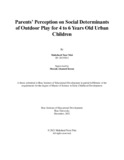| dc.contributor.advisor | Imran, Mostak Ahamed | |
| dc.contributor.author | Nini, Mahsheed Noor | |
| dc.date.accessioned | 2022-03-03T06:14:24Z | |
| dc.date.available | 2022-03-03T06:14:24Z | |
| dc.date.copyright | 2021 | |
| dc.date.issued | 2021-12 | |
| dc.identifier.other | ID 20155011 | |
| dc.identifier.uri | http://hdl.handle.net/10361/16389 | |
| dc.description | This thesis is submitted in partial fulfilment of the requirements for the degree of Masters of Science in Early Child Development, 2021. | en_US |
| dc.description | Cataloged from PDF version of thesis. | |
| dc.description | Includes bibliographical references (pages 42-48). | |
| dc.description.abstract | Play is perceived and valued differently across diverse cultures by different groups. Although play is vital to children’s development, previous researches indicate that nature of play is changing and outdoor play among children is diminishing. It more accurate for children living in urban areas where open play spaces are scarce. To understand perception of Bangladesh’s parents regarding outdoor play, it is essential to identify what they consider important while letting their children play outside home. The present study explored parental perception regarding outdoor play, its benefits, and social determinants of outdoor play for 4 to 6 years old children living in Dhaka city. As it was a qualitative study, data was collected through two different methods: in-depth interview and focus group discussion using an unstructured questionnaire. Total sixteen highly educated participants were selected through purposive sampling technique, where half of them were from middle income background and the other half had high income background based on their income. Data were collected remotely using phone call or zoom platform. After analyzing the descriptive data, it was found that parents had general knowledge about benefits of outdoor play despite their economic background. All parents were equally concerned about children’s safety, traffic movement, while letting them play outside, despite their gender. No parents were willing to let children of this age group play alone without adult supervision. Having reliable neighbors to oversee play was seen as positive factor but mixed reactions were found regarding leaving children alone with playmates. Although all of most of the parents had placed both academic study and outdoor play equally important and some placed more importance on the play. Based on the findings, some recommendations were suggested for parents, government and NGOs at the end. | en_US |
| dc.description.statementofresponsibility | Mahsheed Noor Nini | |
| dc.format.extent | 72 pages | |
| dc.language.iso | en | en_US |
| dc.publisher | Brac University | en_US |
| dc.rights | BRAC University thesis reports are protected by copyright. They may be viewed from this source for any purpose, but reproduction or distribution in any format is prohibited without written permission. | |
| dc.subject | Outdoor play | en_US |
| dc.subject | Social determinants | en_US |
| dc.subject | Safety | en_US |
| dc.subject | Traffic movement | en_US |
| dc.subject | Gender | en_US |
| dc.subject | Adult supervision | en_US |
| dc.subject | Reliable neighbors | en_US |
| dc.subject | Playmates | en_US |
| dc.subject | Academic study | en_US |
| dc.subject.lcsh | Parent participation | |
| dc.subject.lcsh | Child development | |
| dc.title | Parents’ perception on social determinants of outdoor play for 4 to 6 years old urban children | en_US |
| dc.type | Thesis | en_US |
| dc.contributor.department | Institute of Education Development, BRAC University | |
| dc.description.degree | M. Early Child Development | |

